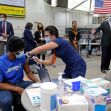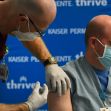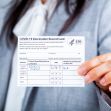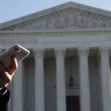As part of the COVID-19 vaccination procedures, the CDC will require states to sign an agreement that allows the CDC to collect information from those who receive the vaccine. The CDC states that the information collected will include names, birthdates, ethnicities, and the address of where a vaccine recipient lives.
Some states, including New York, are fighting back against this CDC requirement. The governor of New York, Chris Cuomo, has expressed that the data collected will be another way to gather information on vulnerable individuals, including illegal immigrants. Additionally, Cuomo explains that by collecting this data, the public may be dissuaded from getting a vaccine, which is so critical to stopping the spread of the virus.
According to the CDC, sensitive information like social security numbers will not be collected. The CDC argues that the purpose of collecting the data is to make sure that people get the required second dose of the vaccine, especially if they are traveling from state-to-state.
The CDC also explains that collecting information such as the ethnicity of who gets vaccinated will allow the agency to determine how certain groups of people respond to the vaccine. Not only that but by collecting the data, any adverse reactions to the vaccine can be noted and dealt with on a case-by-case level.
Even as some states push back against the agreement, the CDC notes that the collection of personal data is not in violation of the Health Insurance Portability and Accountability Act. This law allows the US Department of Health and Human Services to collect data related to the health and wellbeing of the public in order to control disease or prevent disease from spreading. Some states are wary of the data collection after the vaccine has been administered, yet they have signed the agreement anyway.
Members of the government vaccine distribution plan, Operation Warp Speed, met with reporters earlier this week to further explain how the vaccine will be distributed and how the data collection is imperative to the process. Deacon Maddox is in charge of the database in which the sensitive information will be stored, and in a meeting with reporters, he shared the following statement, “There is no social security number being asked for; there is no driver’s license number. The only number I would say that is asked is the date of birth.”
Michael Bars, a spokesman for the Trump Administration, also tried to reassure the public with his statement, “ would only be used to support the unprecedented private-public partnership...to combat the coronavirus and save lives.”
Some immunization experts have weighed in on the conversation and have expressed their unease with data collection as it's a fine line between a patient's privacy and the government's ability to overreach in the public health sector.
A spokesman for the Minnesota Department of Health, Doug Schultz, expressed his hesitancy to the New York Times, stating, “While the state will sign the agreement, they will not hand over names, zip codes, addresses, or ethnicities of those who are vaccinated.”
A professor of medical informatics at Indiana University also shares his concern with the way the data is being collected. Dr. Shaun J. Grannis, who has advised the CDC on data gathering, explains that states typically manage the public’s health and that for the federal government to take over that management would be “concerning.” Dr. Grannis adds, “We are 50 different states with a patchwork quilt of regulations and different perspectives on privacy and security, and I think people are going to be asking the question: What does the C.D.C. do that we can’t do regionally?”
Col. R.J. Mikesh of the US Army is the information technology lead for Operation Warp Speed and explains that state registers differ from state to state and that a “whole of America approach” is what is needed for a vaccine distribution of this type.
In response to criticism from state governors who expressed data collection might cause mistrust from the public, the U.S. Department of Health and Human Service points to a vaccine “FAQ” type document that gave the guidance that the department will explore different ways to protect privacy with vaccine distribution.






